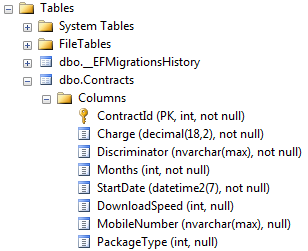Entity Framework Core will represent an object-oriented hierarchy in a single table that takes the name of the base class and includes a "discriminator" column to identify the specific type for each row. EF Core will only include types that are explicitly included in the model and will only implement the discriminator column if two or more types (including the base type) have a DbSet configured for them.
The Model
Here is the model being used to illustrate inheritance in EF Core. It represents the type of contracts that you might enter into with a media/communications business.
public class Contract
{
public int ContractId { get; set; }
public DateTime StartDate { get; set; }
public int Months { get; set;}
public decimal Charge { get; set; }
}
public class MobileContract : Contract
{
public string MobileNumber { get; set; }
}
public class TvContract : Contract
{
public PackageType PackageType { get; set; }
}
public class BroadBandContract : Contract
{
public int DownloadSpeed { get; set; }
}
public enum PackageType
{
S, M, L, XL
}
Convention
Entity Framework Core offers two approaches to configuring the model so that the framework recognizes that an inheritance hierarchy exists. The first is to explicitly include DbSet properties in the DbContext for the base class and each of the derived types:
public class SampleContext : DbContext
{
public DbSet<Contract> Contracts { get; set; }
public DbSet<MobileContract> MobileContracts { get; set; }
public DbSet<TvContract> TvContracts { get; set; }
public DbSet<BroadBandContract> BroadBandContracts { get; set; }
}
This approach has the benefit of enabling you to easily query contract types explicitly e.g.
var mobileContracts = context.MobileContracts.ToList();
An alternative is to include a DbSet for the base class and then implicitly include the derived entities in the OnModelCreating method:
public class SampleContext : DbContext
{
public DbSet<Contract> Contracts { get; set; }
protected override void OnModelCreating(ModelBuilder modelBuilder)
{
modelBuilder.Entity<MobileContract>();
modelBuilder.Entity<TvContract>();
modelBuilder.Entity<BroadBandContract>();
}
}
If you adopt this approach, you will need to use the OfType<TEntity> method to query for contracts of a particular type:
var tvContracts = context.Contracts.OfType<TvContract>().ToList();
Abstract base class
If instances of the base class are not intended to be instantiated, it would be more proper to declare the base class as abstract and to configure that in the OnModelCreating method while adding DbSet properties to the DbContext for the derived classes:
public class SampleContext : DbContext
{
public DbSet<MobileContract> MobileContracts { get; set; }
public DbSet<TvContract> TvContracts { get; set; }
public DbSet<BroadbandContract> BroadbandContracts { get; set; }
protected override void OnModelCreating(ModelBuilder modelBuilder)
{
modelBuilder.Entity<Contract>().ToTable("Contracts");
}
}
public abstract class Contract
{
public int ContractId { get; set; }
public DateTime StartDate { get; set; }
public int Months { get; set;}
public decimal Charge { get; set; }
}
public class MobileContract : Contract
{
public string MobileNumber { get; set; }
}
public class TvContract : Contract
{
public PackageType PackageType { get; set; }
}
public class BroadbandContract : Contract
{
public int DownloadSpeed { get; set; }
}
public enum PackageType
{
S, M, L, XL
}
Each of the approaches outlined above will result in the same table structure being created:

The table includes fields for the properties of the base Contract class, and for the properties in the derived classes. It also includes a column named "Discriminator", designed to identify the derived type that the data row represents. By default, EF Core will use the name of the class as a value for the discriminator column. So the value for a row that contains e.g. a TvContract will be "TvContract".
Configuration
You can configure aspects of the inheritance mapping via the Fluent API. The example above shows how to configure the table name for the abstract base class that didn't have a DbSet included in the DbContext using the ToTable method. In addition, you can specify a name and data type for the discriminator column, and the values to represent each type:
protected override void OnModelCreating(ModelBuilder modelBuilder)
{
modelBuilder.Entity<Contract>()
.ToTable("Contracts")
.HasDiscriminator<int>("ContractType")
.HasValue<MobileContract>(1)
.HasValue<TvContract>(2)
.HasValue<BroadbandContract>(3);
}
In this example, the data type for the discriminator column is specified as an int, and named "ContractType". If you choose to provide your values for the discriminator column, you must provide values for all non-abstract entities in the mapped hierarchy. The Contract entity in this example is abstract so it hasn't been included. But if the base type is not defined as abstract, it must have a discriminator value provided.